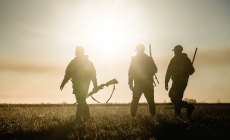 A U.S. Air Force Airman Survival, Evasion, Resistance, Escape specialist shows a SERE candidate how to carve a wooden spoon at Camp Bullis, Texas, Aug. 17, 2015. SERE specialists continue to give advice, training, and encouragement while conducting care and use inspection of the SERE candidate’s tools. (U.S. Air Force photo by Tech. Sgt. Chad Chisholm/Released)
A U.S. Air Force Airman Survival, Evasion, Resistance, Escape specialist shows a SERE candidate how to carve a wooden spoon at Camp Bullis, Texas, Aug. 17, 2015. SERE specialists continue to give advice, training, and encouragement while conducting care and use inspection of the SERE candidate’s tools. (U.S. Air Force photo by Tech. Sgt. Chad Chisholm/Released)
Bartering can be described as the direct exchange of goods or services without the use of a medium of exchange, such as money. When bartering, you can use smart negotiation tactics to create mutually beneficial outcomes. It may be useful to go through some form of training if you plan to barter often. A negotiation class is a good place to develop your skills.
Many people think bartering is a primitive trading system that is not relevant today. However, learning to barter can be a useful survival skill when you cannot use the money to trade. The following are a few tactics that can help you to make better bartering deals.
Negotiation Planning
Many negotiation classes put emphasis on the planning phase of your strategy. When planning to barter, it is important to define the value of the goods or services you have. You should have an idea of what you can offer in exchange for the things you want. Your plan can help you to find valuable deals.
Negotiation Goal Setting
Goal setting is one of the primary lessons taught in a negotiation class. Your entire negotiation strategy is built around your desired outcome or goal. When bartering, you need to make sure that your deals are mutually beneficial. Without well-defined goals, you may end up with goods that you cannot use.
Market Research
When trading without money, it can be a challenge to find exactly what you are looking for. When barter trading, you need to find people who are selling what you want and are interested in what you are offering in exchange.
Negotiation workshops on market research can teach you to study your customers and find products that they value. In many cases, people may be interested in goods that you don’t think are valuable. Knowing more about your customer can help you to develop a win-win agreement.
Cover Your Logistics
Since you are not dealing with money, some barter traders may offer you large bulky goods in exchange for small high-value items. It is good to request delivery services in your negotiation. If your supplier cannot deliver bulky goods to your house, then you need to factor the cost of delivery into your deal.
Improve Your Leverage
One way to improve your barter trading leverage is to control the supply of your key products. Attending supply chain negotiation workshops can teach you to ensure that you don’t run out of products for trading. Your access to products has a strong impact on your negotiation mindset and trading power.
Creating Value
Value addition is a key marketing skill that can help you to create a competitive edge when trading. Many negotiation classes can teach you how to present a deal that is centered on meeting customer needs. To create value when bartering, you can offer other services. These might include free delivery, training, or installation of technical equipment.

Negotiating with Survivalists
If you are looking for valuable food items or rare commodities, you may consider bartering with survivalists. Survivalists, or preppers, are people who actively prepare for emergency situations. These situations are on varying scales—from sudden job loss to natural disasters. Survivalists are known to stockpile food items and water in preparation for shortages. With adequate training, you can learn how to negotiate win-win deals to secure these important survival essentials.
Safety First
In case you are bartering in circumstances of scarcity, your safety is very important. Bartering is normally done face-to-face. So, it helps to have some friends with you when trading. If you are trading valuable items on your own, you risk getting robbed by your customers. Moreover, avoid exposing specific details about your stock, family, and where you live to strangers.
Round-Up
The tactics highlighted in this article only scratch the surface of what you can learn in a comprehensive negotiation class. Bartering is a valuable survival skill that can increase your negotiating options when trading with or without money.






















Leave a Reply
Your email address will not be published. Required fields are marked (required)